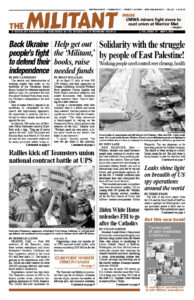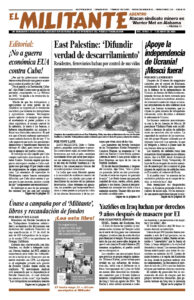ATLANTA — “A few of our union members who are back at work have told us that there is a petition to decertify the union circulating in the mine,” United Mine Workers of America member Charles Foster told the Militant by phone April 16. Foster was one of some 1,100 UMWA members who were on strike at the Warrior Met Coal mines in Brookwood, Alabama, for nearly two years.
The hard-fought strike ended in mid-February when UMWA President Cecil Roberts made an “unconditional offer to return to work,” which was accepted by the company.
Foster, who had worked for Warrior Met for two years before the strike started April 1, 2021, had been working another job during the strike, while maintaining his weekly picket duty, as did many other strikers.
“I took my drug test already and am scheduled for my physical this week,” Foster said. “Then next week I’ll have my retraining before going back to work. The daily schedule down there is two 12-hour shifts — not like the three eight-hour shifts we were used to. And we only get overtime pay after 40 hours!
“Some union members who are back have told us that some of the scabs who were hired recently want to join the union,” Foster said, “and some former union members who crossed the picket line during the strike want to rejoin. I hope that we can get most of those who have been working during the strike back into the union.”
The decertification petition was filed with the National Labor Relations Board April 6. According to the government board’s rules, at least 30% of the workers on the job must sign a decertification petition for a vote to be held. The NLRB lists 795 employees at Warrior Met’s two underground coal mines, the coal prep plant and central shops.
“It’s unfortunate that this is happening at the very moment our members are going back to work and all parties are trying to move forward and the fact is that the company’s consistent refusal to bargain in good faith from the outset of this process has created an atmosphere where this kind of union busting could exist,” UMWA Communications Director Erin Bates told the Valley Labor Report.
“We believe at the end of the day, this petition will be dismissed,” she said.
The process of rehiring former strikers is proceeding slowly, “but some are getting back to work every day,” veteran miner Otis Sims, who recently retired, told the Militant.
The strike began when Warrior Met Coal bosses, who had taken over the Brookwood operations of bankrupt Jim Walter Resources in 2015, refused to restore any of the major concessions in wages and working conditions forced on the union when they took over.
In addition to picketing at the struck sites and railroad crossings, the union held regular solidarity rallies, often weekly, drawing support and substantial financial contributions to the strike fund from many other unions in the area and around the country.
The company hired scabs to restart production. These replacement workers included experienced miners from other states as well as Alabama, new workers who recently got their mining papers and some union members who crossed the picket line.
Warrior Met got production going at both the No. 4 and No. 7 mines, anxious to fill orders for high-priced metallurgical coal used in steelmaking around the world and generate big profits for the company, despite the strike.
Union members continue to get union strike benefits until they are rehired and get their first Warrior Met paycheck.
The union is fighting to get the jobs back for 41 workers the company says are barred from returning to work, charged with alleged picket line violence. They include some of the union’s most active members and local officials.

